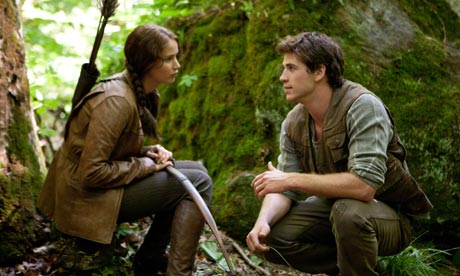
Reviewing the newly released "meta-horror" film The Cabin in the Woods at the end of last week, Guardian critic Peter Bradshaw asked what seems to me a question that could be applied to The Hunger Games, the fantasy thriller set to gross half a billion US dollars at the box office this week:
"What awful human need is being fed by seeing attractive young people in states of semi-undress who are suddenly, brutally slaughtered, almost as if they are being punished for being young and sexy?"
Perhaps an answer lies in widening the question to all literature: what role does slaughter play across classical tragedy, renaissance tragedy and in modern memoirs and biographies? The trick is to create a learning device while kidding audiences it is no such thing. But in saying that, and in looking for messages, it's easy to be misled by the apparent or obvious resolutions: evil was overcome, human nature is competitive, you only live once – and the like.
So with The Hunger Games, it would be legitimate to walk away from the cinema thinking any of the following: it's a dog-eat-dog world, you can only trust yourself, better to be strong and good-looking than weak and clever. I've heard several adults being "concerned" or "worried" about the film precisely because it seems to show a Lord of The Flies-like regression in young people's behaviour, suggesting to them that all the hunting-down and murdering going on is not only what any of us might do under the futuristic, fascist, social and political pressures shown in the film, but what is actually going on now in our schools and streets.
Another message the film conveys, of course, is a feeling you don't get at the end of Romeo and Juliet, namely amor vincit omnia – love conquers all. I won't spoil the plot, but let's say my children were right to tell me in the Odeon that I didn't need to worry. Even so, carnage happens.
Bradshaw's challenge to us is to ask if this is pleasure and, if so, how are we nourished by that? I think some of this is a version of schadenfreude: pleasure in other people's suffering which in turn is a form of gratitude that it hasn't happened to us – "there but for the grace of God (or something), go I". To which we could add, "and even if I was as young and sexy as them, it wouldn't have saved me".
But I'm a personal and social optimist and I think even the most fearful, heartless and hopeless dystopias contain the seeds of another view, expressed by the word "unless". And this "unless" makes us look at ourselves, to a point outside of the story, beyond our own bodies, out to the body politic. The "unless" sentence that hovers over these dramas is, "these things will happen unless we shape another way of living together".
What I thought was uplifting about The Hunger Games was that I was given plenty of clues of how power was enacted in this totalitarian future society – enough clues for me to see parallels in past and present political regimes. I felt I was being warned and I quite like being warned.
And the tiny facial gesture that a grizzled Donald Sutherland makes with his mouth at the very end, when he realises that the perfect running of his system has been undermined, made me give an inward cheer.
• Follow Comment is free on Twitter @commentisfree

